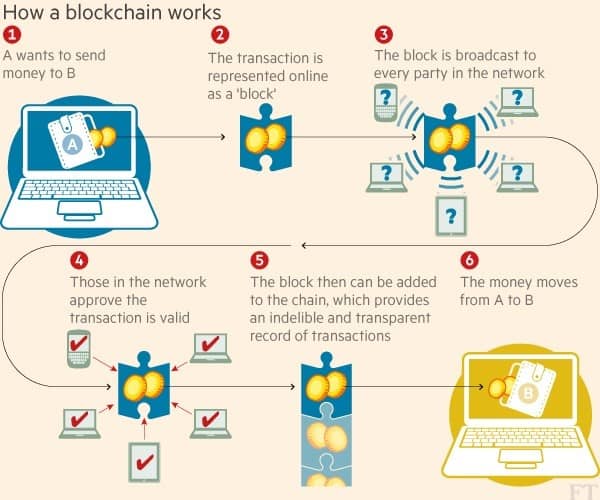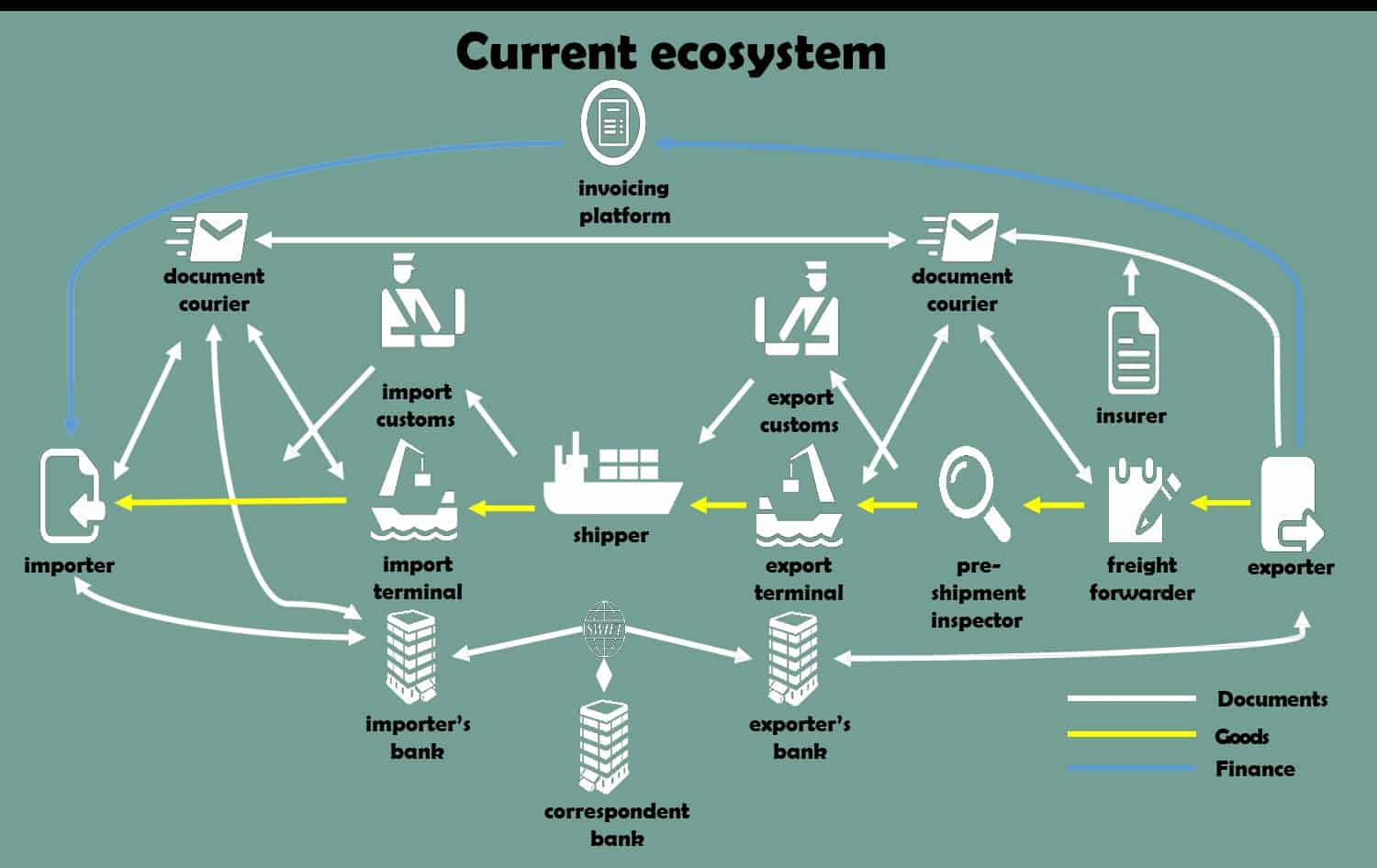Surely there were many times that you’ve heard that Blockchain is a revolution in economics and the key to future. And that’s right. In addition, if we talk about sectors such as logistics, its impact will be brutal…
But, do you really know what Blockchain is and why is it the key to future?
What is Blockchain?
Blockchain is a complex concept that we been hearing a lot lately, but actually not so difficult to understand…
Internet has changed the world. However, there is something that has not changed much: we do not trust each other, for that reason, especially when it comes to transactions; we need another part to verify who we are. That is why until now, intermediaries, such as banks or Paypal (very present in online transactions), have been an essential part of the system.
The problem is that these intermediaries, while guaranteeing certain security, obtain our data and market with them. Blockchain is a solution to this precisely.
Here is an example: A person (sender) wants to transfer 2.000€ to someone (receiver). The normal procedure at that time is that the sender demanded that the bank withdraw the import from an account and transfer the Money to the recipient’s account. In just a few hours (perhaps less), the bank will have made the operation and the money will have gone from one place to another with a simple automatic balance of accounts.
At this point, there is only one problem, that neither the sender nor the recipient have had any control over the operation process and only the banks involved have all the information. In addition, both the issuer and the receiver are subject to the conditions (and commissions) of the bank.
This is where Blockchain comes into play, which basically comes to get rid of the intermediaries, taking away power to the banks and granting control of the processes to the users.
Therefore, we can define the block chain as an enormous book of accounts, a database in the form of an accounting book, from which all those who participate in the network keep a copy and where all transactions are recorded. In this book of accounts, the records (which are to be the blocks) are linked and encrypted to guarantee security and protect the privacy of the transactions that are carried out. It is an immutable and distributed registry, which is both integrable and programmable.
Here some important keys about blockchain:
I give you some important keys to the blockchain:
- Transactions do not necessarily have to be economic, it can be any type of transaction.
- Consensus is one of the major keys: if we all have the same information, this information is given for a fact. Everything works by consensus of the parties, and the past cannot be erased or modified, nor can it operate outside the rules given by the network itself.
- In order for a transaction to be carried out, there must be several users who verify it and that the corresponding block (each block has a number of transactions that can vary) is registered in the large book of accounts that we talked about.
This infographic shows how it works in a very illustrative way:

Blockchain platforms
It is important to know that there is not a single kind of blockchain, there are many blockchains that can be used not only for money transactions, but for any kind.
There are three types of block strings:
BLOCKCHAIN PUBLIC
In this type of block chain there are no restrictions to add nodes (users) and anyone could use a client to start participating.
Bitcoin is an example. In fact, this concept was born by the hands of the famous digital currency.
This model gives rise to blockchain networks of thousands of independent nodes that are distributed throughout the world. The problem of this model is that in business environments, where privacy and performance have a decisive weight, it is difficult to assume it and implement.
PRIVATE BLOCKCHAIN
Private blockchain is more exclusive, for only the ones authorized by the owners. In addition, this type of blockchain has very specific uses.
In this way, without losing the blockchain essence, networks can be configured between actors of a particular field, and participation is more controlled.
MULTICHAIN
In this case, we speak of an evolution to improve the characteristics of the use of private networks. Starting from an open source philosophy and license, it allows the creation of regulated networks “with permissions”, in which an administrator can define and grant different kind of permissions. It is a platform that allows to design, implement and operate blockchain blocked registers quickly and easily. To create private blockchains, means that the creator can decide who can connect to the platform to send and receive transactions, create assets and blocks. In addition, you can also decide to open your blockchain and make it public. The platform allows you to create your own digital currencies to make exchanges and keep track of transactions on your network.
The impact of blockchain on logistics
How and to what extent does all this affect the logistics sector?
As we all know, international trade requires complex transactional logistics operations involving a large number of entities, as well as requiring the control of information flows and money. On the diagram you can see the complexity of the process. They are processes that involve more than 10 different entities and where more than 30 documents are generated and moved.
These different participants are all around the world and many times they do not know each other. The lack of knowledge and trust, forces to implement an enormous amount of paperwork and of operations that do not add value. In a container transport from Asia to Europe by ship, 40% of the time is lost in waiting, essentially due to customs and operational procedures of all kinds due to lack of confidence between the parties.

Different solutions in the logistics field have varied over time. Initially we talked about architectures that departed from a central server. This model evolved resulting in solutions in the cloud today widely used.
The blockchain is presented as a new model. A future model that will bring decentralization, confidence and collaboration towards the efficiency in logistics operations.
Imagine the scope of blockchain in logistics! It would allow you to connect to importers and exporters, logistics operators, financial entities, insurers and any other agent involved.
This new model would help accelerate processes, ensure a more agile operation, reduce costs, more transparency and improve the auditability of the process.
The advantages, as you can see, are enormous!
When will be implemented?
Technology promises and allows us to ensure that it will produce a radical change in how we do things today. But we are not facing any change, we are facing a paradigm shift. In front of a change of what we know for something totally new.
Let’s say it is in an initial phase and there are still many challenges to face, both in a technological and operational point of view and of legal and regulatory matters.
The challenge is great and ambitious. And the projects are, for the moment, ideas in the development phase.
In addition, we must take into account that intermediaries, who have become an integral and essential part of the economy and society, will not make it easy the transition for this innovation to happen. Before this revolution that we so much talked about, succeeds these same intermediaries will put all the means to reject it or, in a more optimistic case, adapt it to their own interests and needs.
I leave you a video where you can see a real case of implementation of blockchain in the world of logistics by IBM for Maersk.


